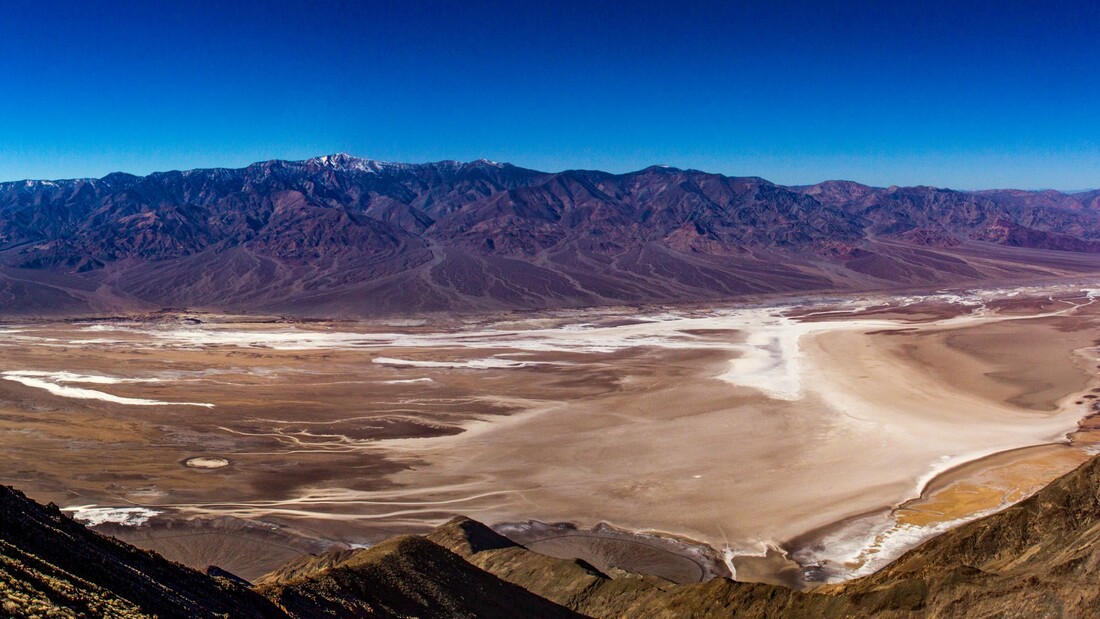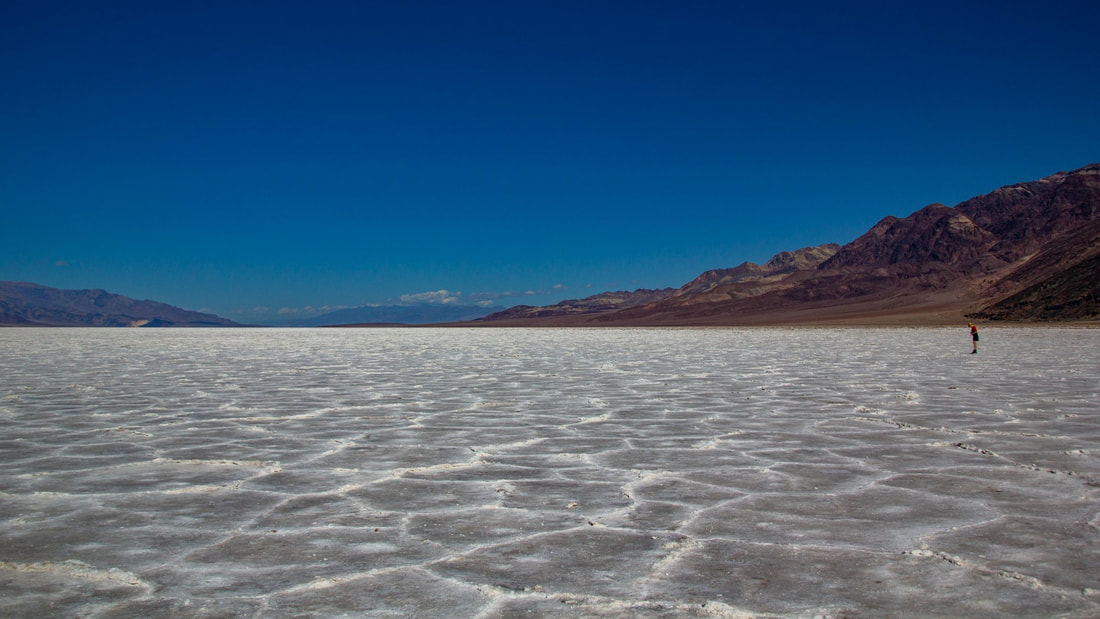Scott AndersonOn average, Death Valley gets two inches of rain a year. Two inches. There are two major mountain ranges—the Panamint Range, pictured here, and the Sierra Nevadas beyond them to the West that trap weather systems that would otherwise drop precipitation from the Pacific, making it one of the driest places on earth. Yet it is fair to say that Death Valley, one of the driest places on earth, has been shaped by water. Well, water and tectonics.
0 Comments
Maggie BreenEzekiel 2:1-5 † Psalm 123 † 2 Corinthians 12:-10 † Mark 6:1-13
So I lead a bit of a double life. I have since I started in this work of ministry. I work part of my time here at St Andrew thinking and learning with you all about how we offer our gifts for the sake of compassion and justice and peace, and for part of the time I work outside of this congregation thinking and learning with others about how the church and people of faith best show up and partner to make a difference in the world. This arrangement is partly by necessity. The church is changing, and pastors’ jobs must look different if we are going to be sustainable. And it’s partly, maybe more so, by design. Jobs like mine and Julie Kae’s, and many others in bi-vocational roles, help position the church to be in closer conversation with how this life we proclaim gets lived out and what we can learn from the Spirit as it is at work in the world. Currently the work outside of the walls of the church has me at Seattle University working with scholars and practitioners to see what we can learn around what it takes for congregations, and faith-based service organizations, advocacy groups, and community organizers to be effective in moving society towards one where all neighbors are able to flourish. In the course of this work I get to talk with all sorts of people. I get to hear from leaders and activists and ordinary folks of all stripes about the work they are called to, what they are challenged by and what they are learning as they meet these challenges in innovative and life-giving ways. On Friday, I was sitting with two folks who work with an organization that has been on the streets caring for those with no safe place to go for years and years. They are out of a tradition that has the care of unhoused neighbors deep in their DNA. They work long hours and are grounded in a deep faith and prayer life. They have extensive partnerships and are looked to by their local police, hospitals and government as a reliable place to turn to when no one else can help. And on the spectrum of progressive to conservative, liberal to evangelical, it is pretty widely known that their tradition sits, for the most, part right of center. Scott Anderson Isaiah 64:1-9 † Psalm 80:1-7, 17-19 † 1 Corinthians 1:3-9 † Mark 13:24-37
There is no less light in the world. I understand this may be difficult for us to imagine on these days in our Pacific Northwest when light seems to be such a scarce commodity. The comments began soon after we said goodbye to Daylight Saving Time and gave ourselves that extra hour of sleep—a brief reward for the inundation of darkness that now affords us only 8 hours and change of this dripping, gray miasma we now call daylight. If you commute, you probably go to work and come home in this blanket of darkness. The same is true for school. It can be overwhelming. Especially so, perhaps, this year. But, unless you believe in a flat earth, and the heavens as some kind of a literal canopy above it, we know this is simply a matter of perspective. There is no less light in the world. We are simply spending more time in the shadows these days as our earth has begun that part of its travels around the sun that radiates more energy and light on the southern hemisphere than the northern. It’s a matter of perspective. The sun shines just as bright. The light is there, along with the dark. It always is. It’s just that we don’t get the same angle on it that we do in those July days when the light lasts for 16 hours and the darkness is almost non-existent to those of us who go to bed by ten or wake up after five. It’s a matter of perspective, and timing, this relationship we have to darkness of all sorts. There is this tension in us, we creatures who live on this fragile earth. Call it circadian if you wish. We are circadian Cascadians, you and I. We are defined and limited and bounded in time and space. We oscillate between wanting to tear down and wanting to construct. Sometimes the first is necessary in order to do the second. Sometimes that destructive voice is just the first voice—the voice of pain and isolation and vulnerability that wants to tear open the heavens and let the light shine through the darkness, that wants the earth to shake so someone else might feel what you feel, that wants others to taste the tears that have been your bread for so many nights under these stars. Parker Palmer captures this insight, I think, when he suggests that violence “is what we get when we do not know what else to do with our suffering.” So Mark imagines what Isaiah craves: The stars begin to fall when God tears through the fabric of the heavens to come down to earth to fix everything. Wouldn’t that be some good news! All the abusive and opportunistic powers of the world, all the lesser lights give way to the one true light, the one true power, the one true Love that can fix all that is broken. Scott AndersonExodus 33:12-23 † Psalm 99 † 1 Thessalonians 1:1-10 † Matthew 22:15-22
Orchestral strings playing, timpani chimes in, a harp glistens. I think, the theme from the Hunger Games, but it is actually the overture to the 1962 film Lawrence of Arabia.[i] And over the music, a voice: “We begin with a story of tribute to a great and dominant empire. Imagine yourself an emissary from a far-off province. What would you offer Caesar in devotion? Something that says loyalty and fealty and also the best features of your home? … Now, what if Caesar was Jeff Bezos and the empire was called Amazon?”[ii] That intro this week to the segment on the NPR news show The Takeaway caught my attention. It was the day that homework was due for all suitors to Amazon’s second headquarters, or “HQ2.” It brought me to today’s text, of course. Render to Caesar what is Caesars; render to God what is God’s. It was a clever tease which led to an examination of the give and take, the tensions and challenges that arise in our current culture of complex needs and competing loyalties. We need Amazon. We love Amazon. I am a Prime member, I confess. They have transformed Seattle, perhaps more than Microsoft or Boeing before it, or before them, the European settlers that stripped thousands of acres of ancient forest in only a few years and bulldozed tall hills in a few more to tame this metropolis. And yet, according to some examinations, being HQ1 is something of a mixed bag. The effect of Amazon’s rapid growth has been called a prosperity bomb with a wide blast zone. Amazon’s story began in the midst of the Great Recession when unemployment was 10% and people were crying out for jobs. The benefits have been widely touted to potential suitors of HQ2: the rapid addition of thousands of high-paying, six-figure jobs, the transformation of the economy, massive infrastructure investment. Scott AndersonExodus 32:1-14 † Psalm 106:1-6, 19-23 † Philippians 4:1-9 † Matthew 22:1-14
Muhammad Yunus, the Bangladeshi social entrepreneur and recipient of the 2006 Nobel Peace Prize for his pioneering work in microcredit got a message one day from the office of Franck Riboud. Riboud was the chairman and CEO of the Danone Group, a French food conglomerate whose American brand is most familiar to us, I suspect, for the yogurt in our grocery stores and refrigerators. Riboud had heard of Yunus’ work in Bangladesh creating a banking system that made small loans available to people full of ideas, but too poor to qualify for traditional bank loans to fund them. It began in 1976 when Yunus lent $27 from his own pocket to 42 women in the Bangladeshi village of Jobra. By 2007, the Grameen or “village” Bank had issued over $6 billion to more than 7 million borrowers, with more than 94% of Grameen loans going to women.[i] Grameen Bank put into action Yunus’ belief that, very small loans could make a disproportionate difference to a poor person. Contrary to the practices of our Western system which is built on the assumption that the more you have, the more you get, Yunus believed, that the poorest of the poor, given the chance, would not only take the opportunity to improve their lives and escape from poverty, but that they would be at least as reliable as other loan recipients in repaying their loans. And he was right. To date, less than 1% of Grameen loans have defaulted, and the system of microcredit has exploded across the globe, even extending to a number of branches in New York City. It was October 2005 when Riboud reached out to Yunus who tells of the meeting and the handshake that led to the creation of one of the first social businesses. Unlike most of our businesses in the west, organized around the primary goal of making money for its investors, social businesses are created to meet a social goal; they are built around a mission. They pay no dividends. They sell products at prices that make the business self-sustaining. Owners get back their investment over time, but no profits, which instead stay in the business to finance expansion, create new products, and do more good. [ii] Scott AndersonExodus 12:1-14 † Psalm 149:1-9 † Romans 13:8-14 † Matthew 18:15-20
Do you remember the Somali pirates? They made news about 5 years ago with a spate of ship hijackings off the horn of East Africa. The story gained some traction in the news and lots of mixed reaction, even inspiring the 2013 movie “Captain Phillips” played by Tom Hanks. The movie tells of a 2009 Somali hijacking—the first of an American cargo ship in 200 years. I remember because it was one of those stories that seemed to appear in the news out of nowhere, and then disappear almost as quickly. Piracy in the modern world? Where did this come from? And why? And why now? It turns out political instability—essentially a decades-long civil war had resulted in a missing-in-action Somali government. In the vacuum of leadership and the dismantling of the local navy, foreign ships began to exploit the coast, invading local fishing grounds and poisoning the waters with illegal waste that further decimated the fishing population. It effectively ended the fishing trade that had provided a living for these Somalis and their families. They turned to piracy out of desperation, holding crews hostage for ransom. Scott AndersonReadings for this Sunday:
2 Samuel 5:1-5, 9-10 | Psalm 48 | 2 Corinthians 12:2-10 | Mark 6:1-13 The packing list is small. What a gift that is! Just a staff, shoes, the clothes on your back. No need to worry about bag fees or security measures. No images of trudging down dusty roads dragging behind you a pile of luggage, with that one wheel that broke on that last leg of the trip giving you fits as it drags a wave of dirt with it, kicking up dust, your shoulders getting tired. |
St. Andrew SermonsCategories
All
|



 RSS Feed
RSS Feed